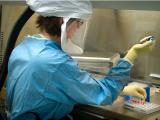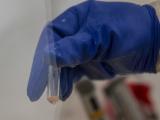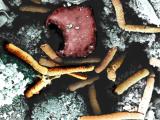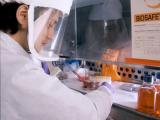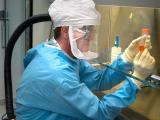Jun 18, 2002 (CIDRAP News) – Researchers at the University of Texas report that they have engineered antibodies that can protect rats from the effects of the anthrax toxin, possibly pointing the way toward development of similar antibodies that could protect humans.
Writing in the June issue of Nature Biotechnology, Jennifer A. Maynard and colleagues describe the development of a panel of antibodies designed to bind to protective antigen (PA), one of three components of the anthrax toxin. The antibodies with the highest binding affinity for PA protected rats from the effects of the toxin in a short-term experiment.
"High-affinity toxin-neutralizing antibodies may be of therapeutic value for alleviating the symptoms of anthrax toxin in infected individuals and for medium-term prophylaxis to infection," the researchers write.
The authors engineered antibodies through a process that began with the use of polymerase chain reaction to isolate heavy-chain and light-chain genes from four potent toxin-neutralizing monoclonal antibodies. This led to production of compounds called single-chain variable fragments (scFvs) and scFvs fused to a human constant kappa domain (scAbs), with varying PA affinities. The antibody fragments were found to have good resistance to heat and to breakdown in serum, the report says. The compounds showed no loss of activity after 7 days of incubation in serum at 37°C, and one clone still retained about 25% of its binding activity after 2 hours at 70°C.
In host organisms, PA attaches to receptors on macrophages before facilitating the passage of the other two anthrax toxin components into host cells. The researchers tested the ability of the antibody fragments to protect mouse macrophages in vitro and found that protection correlated strongly with antigen affinity. "Significantly better protection is achieved when the antibody-PA affinity is comparable to or higher than that of PA binding to its macrophage receptor," the report states.
In in vivo testing, the researchers injected rats with the antibody fragments and, 5 minutes later, injected them with PA and anthrax lethal factor (another component of the anthrax toxin). The rats were then monitored for 5 hours (the maximum time allowed under animal research guidelines governing the study). Control rats all died about 90 minutes after injection. As in the in vitro tests, protection correlated with the antigen affinity of the antibody fragments; rats injected with the higher-affinity antibodies survived the longest. An scAb variant called 1H afforded complete protection for the 5 hours. "Enhanced protection by scAb fragments as compared with the scFv antibodies is most likely a consequence of greater serum half-life," the report says.
The findings lead the authors to conclude that the benefit of increased binding affinity is enhanced with antibody fragments of higher molecular mass. "On the basis of these considerations, we are currently generating humanized IgG antibodies incorporating the 1H binding site for testing in a non-human primate model," they write. "In conjunction with antibiotics, these antibodies are likely to prove valuable for alleviating the toxin-related symptoms of infected individuals. In addition, high-affinity, recombinant anti-PA antibodies may confer medium-term protection against the progression of anthrax infection."
Maynard JA, Maassen CBM, Leppla SH, et al. Protection against anthrax toxin by recombinant
antibody ragments correlates with antigen affinity. Nature Biotech
2002;20(6):597-601
Abstract
(requires free registration)

